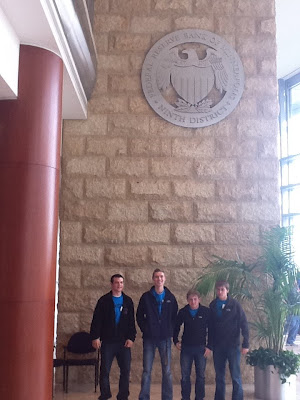December 8, 2011
December 6, 2011
November 26, 2011
November 24, 2011
Target and Best Buy Reach a Game Theory Nash Equilibrium
November 16, 2011
Keynes vs. Hayek: The Podcast Battle
November 15, 2011
CRIBS...COLLEGE EDITION
Video: Housing Meltdown = Mansions for College Students
November 9, 2011
November 2, 2011
October 17, 2011
October 10, 2011
October 7, 2011
October 6, 2011
Hungry Muppet: The New Semase Street Character
October 3, 2011
October 2, 2011
"Jay Leno, Economically Challenged" Assignment
September 27, 2011
August 3, 2011
May 26, 2011
Costa Rica Baby!



What's a Degree Worth? An Interactive Graph.
May 12, 2011
The Biggest Bill Evah Actually Still Has Value.
 Apparently the biggest bill evah printed still has value, as a collectors item. Here, the Journal writes:
Apparently the biggest bill evah printed still has value, as a collectors item. Here, the Journal writes:"A 100-trillion-dollar bill, it turns out, is worth about $5.
Photo Above: A man in Harare, Zimbabwe, carried cash for groceries in 2008.
That's the going rate for Zimbabwe's highest denomination note, the biggest ever produced for legal tender—and a national symbol of monetary policy run amok. At one point in 2009, a hundred-trillion-dollar bill couldn't buy a bus ticket in the capital of Harare. 
But since then the value of the Zimbabwe dollar has soared. Not in Zimbabwe, where the currency has been abandoned, but on eBay.
The notes are a hot commodity among currency collectors and novelty buyers, fetching 15 times what they were officially worth in circulation. In the past decade, President Robert Mugabe and his allies attempted to prop up the economy—and their government—by printing money. Instead, the country's central bankers sparked hyperinflation by issuing bills with more zeros.
The 100-trillion-dollar note, circulated for just a few months before the Zimbabwe dollar was officially abandoned as the country's legal currency in 2009, marked the daily limit people were allowed to withdraw from their bank accounts. Prices rose, wreaking havoc.
The runaway inflation forced Zimbabweans to wait in line to buy bread, toothpaste and other essentials. They often carried bigger bags for their money than the few items they could afford with a devalued currency.
Today, all transactions are in foreign currencies, mainly the U.S. dollar and the South African rand. But Zimbabwe's worthless bills are valuable—at least outside the country. That Zimbabwe's currency happened to be denoted in dollars has amplified appeal, say currency dealers and collectors, particularly after the global financial crisis and mounting public debts sparked inflationary fears in the U.S.
"People pick them up and make jokes about when that's going to happen here," says David Laties, owner of the Educational Coin Company, a currency wholesaler based in Highland, N.Y.
Dealers prescient enough to buy Zimbabwe's biggest notes while they were in circulation are now taking their investment to the bank. Mr. Laties spent $150,000 buying bills from people in South Africa and Tanzania with experience moving currency and other clandestine cargo, including migrants, across Zimbabwe's borders. Sensing that Zimbabwe's last dollars would be "the best notes ever" on the collector's market, he even fronted $5,000 to someone who approached him over the Internet.
"It worked out," he says. "I got my notes."
Frank Templeton, a retired Wall Street equities trader, bought "quintillions of Zimbabwe dollars" through a broker from Zimbabwe's central bank. On eBay, he now does a brisk trade in the bills from his home in the Hamptons, on New York's Long Island. "I like to say Warren Buffett made a lot of people millionaires, but I've made more people trillionaires," Mr. Templeton says. The dealer paid between $1 and $2 for each of the bills in several purchases over about a year, and now sells them for around $5-$6 apiece.
May 9, 2011
May 4, 2011
May 3, 2011
3rd Annual AP Economics Exam Facebook Global Review
Macro: http://www.facebook.com/event.
Micro: http://www.facebook.com/event.
"I got a 5 on my AP Macro test. Thanks so much for doing this!"
"I got a 4 on my AP Macroeconomics!! thank you all soo much :)"
April 28, 2011
Personal Finance Decathlon at the Fed
 Photo Below: Team hard at work, discussing how the other team knows all the answers. And showing off their cool shirts.
Photo Below: Team hard at work, discussing how the other team knows all the answers. And showing off their cool shirts. Photo Below: Eating a great lunch in the Official Fed dining room. The team also had the pleasure of dining with Mr. Roger Sit, who manages over $8 billion dollars and is CEO of Sit Investments (one of the sponsors of the Personal Finance Decathlon.) To read the fascinating story of his father, Eugene, who fled communist China with nothing, read here.
Photo Below: Eating a great lunch in the Official Fed dining room. The team also had the pleasure of dining with Mr. Roger Sit, who manages over $8 billion dollars and is CEO of Sit Investments (one of the sponsors of the Personal Finance Decathlon.) To read the fascinating story of his father, Eugene, who fled communist China with nothing, read here. Peace out, Fed.
Peace out, Fed.
April 27, 2011
AP Macro Foreign Exchange Market Activity
April 21, 2011
$5,000 an Hour For a Video Chat. Not Bad Work if You Can Get It
Some of the fees for a one-hour video chat are:
Nobel economist Gary Becker: $5,000
Economist Steven Levitt (of Freakonomics fame): $3,000
Author Steven Dubner: $3,000
Political blogger Nate Silver: $1,000
Harvard economist Jeffrey Miron: $400
As Bloomberg reports:
"The site’s roster blends the interests and contacts of Adams, a top poker professional who taught undergraduates in Harvard’s Department of Economics for the past eight years. Adams, the primary research assistant for Michael Lewis’s book “The Big Short,” began giving one-to-one poker lessons over the video-chat service Skype in March 2010, charging $300-$400 per hour.
“I was amaze d at how easy it was to drum up business,” Adams, a regular in some of the world’s biggest cash poker games, said in a telephone interview. “I realized that one-to- one teaching was a great opportunity to monetize content. What you’re doing is searching the world for that small slice of people, maybe 15 to 30, who are willing to pay a high price for your content.”
d at how easy it was to drum up business,” Adams, a regular in some of the world’s biggest cash poker games, said in a telephone interview. “I realized that one-to- one teaching was a great opportunity to monetize content. What you’re doing is searching the world for that small slice of people, maybe 15 to 30, who are willing to pay a high price for your content.”
April 4, 2011
March 9, 2011
PREZI Project
March 4, 2011
Additional Sources for Fed Essay Contest
James J. Heckman, Noble prize winning economist from U. of Chicago: The declining American high school graduation rate: Evidence, sources, and consequences.
GREAT Powerpoint HERE by Heckman. Here is Heckman on Job Creation.
Debt, Deficits, and Uncertainty Harm Economic Growth:
Fed Chairman Ben Bernanke here.
More here, and here. Robert Samuelson talks about uncertainty hindering economic growth here. More about Keynesian Policy, and huge deficits here.
Debt is now at a level where economic growth and job creation are affected, here.
Government Spending and job creation here.
All this debt crowds-out private investment. Here is the definition of the crowding-out effect.
From ABC News here.
Are there Benefits to Being Unemployed? Do unemployment benefits increase unemployment?
Read here. Obama economist Larry Summers here, on how unemployment insurance reduces the incentives to search for jobs.
Not in the Labor Force? Good article on discouraged workers here.
And don't forget that 60 Minutes Video, previously viewed in class.
Key Instructions: "First, you must be clear about the need for intervention. If you argue that the government should play a role, you must explain why. Further, you need to consider the benefits of government policies as well as their costs, and your account of the costs should consider possible unintended consequences. If you want to argue that the government should take a more hands-off approach, you need to explain why you think that will work better than the status quo."
March 2, 2011
March 1, 2011
TANSTAAFB

February 24, 2011
February 21, 2011
Terracotta Warroirs: Xi'an, China
February 7, 2011
January 20, 2011
Can He Really Do This?
In the above video, some British dude tries to make a toaster on his own, to demonstrate the wonders of trade and comparative advantage, all the while dispelling myths about economic self-sufficiency.
January 11, 2011
"Best Jobs" according to the Wall Street Journal

Here is a list of the Best Jobs in America based on "200 jobs based on income, working environment, stress, physical demands and job outlook, using data from the Labor Dept. and U.S. Census and researchers' own expertise." Click the above image to enlarge, and go here to see the complete list.














